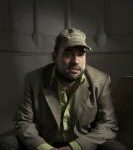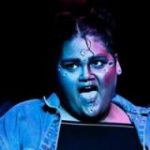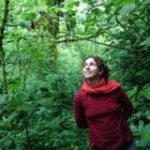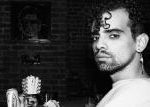Translated by Raquel Salas Rivera
Diosa te salve, Yemayá
Diosa te salve, Yemayá
llena eres de ashé
la babalawo sea contigo
bendita tus hijas que toman la justicia en sus manos
y bendito es el fruto de tu océano-río Oshún
Santa Yemayá
madre de diosas
consentidora de todos los amores
de todas las lenguas y enjambres de labios
de toda hembra que ama a otra mujer
Ave Purísima Yemayá
santificada por criar a nuestras hijas e hijos
y enseñarles a devolver el golpe del marido borracho
maltratador
abusador
llena eres de balas
y cuchillas
prestas para el ajusticiamiento
rueguen por nosotras los orishas
Obatalá
Orula madre y padre
los dioses del santo hermafroditismo Eleguá y los ángeles transexuales
ahora y en la hora
de la libertad
de la desobediencia civil
de los defensores
de nuestra entrega por la patria
y nuestra bandera borincana
amén
Hail Yemayá
Hail Yemayá
full of ashé
the babalawo is with you
blessed are your daughters that take justice into their own hands
and blessed is the fruit of your river-ocean Oshún
Holy Yemayá
mother of gods
spoiling us with all the loves
all the languages and swarms of lips
of each woman who loves another woman
Our Yemayá, who art in heaven
hallowed be thy name for raising our daughters and sons
and teaching them to hit the drunk husband back
abuser
full of bullets
and knives
ready to enact justice
pray for us, orishas
Obatalá
Orula mother and father
the gods of the hermaphrodite saint Eleguá and the trans angels
now and in the hour
of our freedom
of our civil disobedience
of the defenders
of our complete surrender to our patria
and our borincana flag
amén

Yolanda Arroyo Pizarro (Guaynabo, 1970). Es escritora puertorriqueña. Ha sido elegida como una de las escritoras latinoamericanas más importantes menores de 39 años del Bogotá39 convocado por la UNESCO, el Hay Festival y la Secretaría de Cultura de Bogotá por motivo de celebrar a Bogotá como Capital Mundial del libro 2007. Fue premiada Escritora Puertorriqueña del Año 2016 en Literatura Queer por el Centro LGBT de Puerto Rico. Ha publicado libros que denuncian y visibilizan apasionados enfoques que promueven la discusión de la afroidentidad y la sexodiversidad. Es Directora del Departamento de Estudios Afropuer-torriqueños, un proyecto performático de Escritura Creativa con sede en la Casa Museo Ashford, en San Juan, PR y ha fundado la Cátedra de Mujeres Negras Ancestrales, jornada que responde a la convocatoria promulgada por la UNESCO de celebrar el Decenio Internacional de los Afrodescendientes. Ha sido invitada por la ONU al Programa “Remembering Slavery” para hablar de mujeres, esclavitud y creatividad en 2015. Su libro de cuentos Las negras, ganador del Premio Nacional de Cuento PEN Club de Puerto Rico en 2013, explora los límites del devenir de personajes femeninos que desafían las jerarquías de poder.Caparazones, Lesbofilias y Violeta son algunas de sus obras que exploran la transgresión desde el lesbianismo abiertamente visible. La autora ha ganado también el Premio del Instituto de Cultura Puertorriqueña en 2015 y 2012, y el Premio Nacional del Instituto de Literatura Puertorriqueña en 2008. Su libro Animales de apariencia inofensiva fue declarado Libro del año 2015 y su libro Ojos de luna fue declarado Libro del año 2007, ambos por el Periódico El nuevo día. Ha ofrecido conferencias en Ghana, Africa, FIL Guadalajara de México y Casa de las Américas en Madrid, España. También ha sido Escritora Invitada para NYU, Vermont University, Florida State University y la Universidad de Pennsylvania. Ha sido incluida en la plataforma TED Talk como conferenciante con la charla magistral “Y tu abuela, ¿a dónde está?” Su obra se ha traducido al alemán, francés, italiano, inglés, portugués y húngaro. http://narrativadeyolanda.blogspot.com/
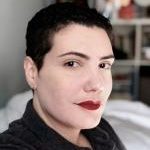
Raquel Salas Rivera is a Puerto Rican poet who lives in Philadelphia. Their work has appeared in journals such as the Revista del Instituto de Cultura Puertorriqueña, Apogee, BOAAT, Círculo de Poesía, Cosmonauts Ave, Waxwing, Dreginald, and the Boston Review. They are the author of Caneca de anhelos turbios (Editora Educación Emergente), oropel/tinsel (Lark Books), and tierra intermitente (Ediciones Alayubia). Their book lo terciario/the tertiary is forthcoming in 2018 from Timeless, Infinite Light. Currently, they are Co-Editor of The Wanderer, and Co-Editor of Puerto Rico en mi corazón, a collection of bilingual broadsides of contemporary Puerto Rican poets. If for Roque Dalton there is no revolution without poetry, for Raquel, there is no poetry without Puerto Rico. https://raquelsalasrivera.com/


